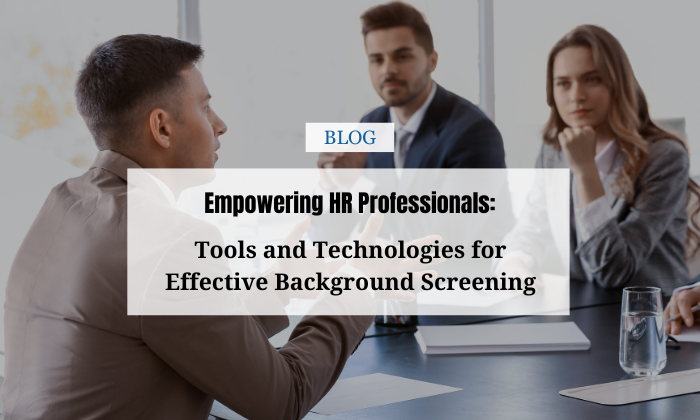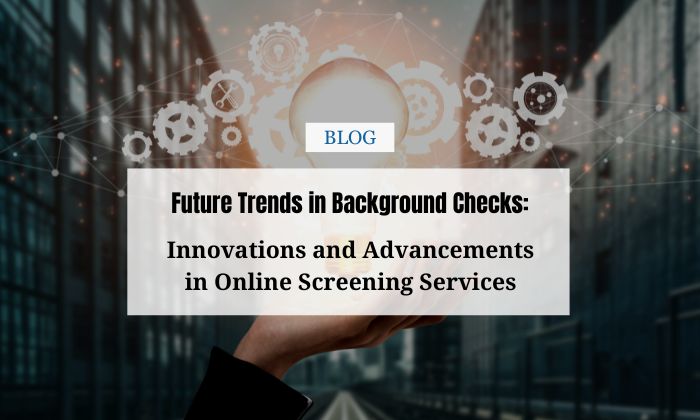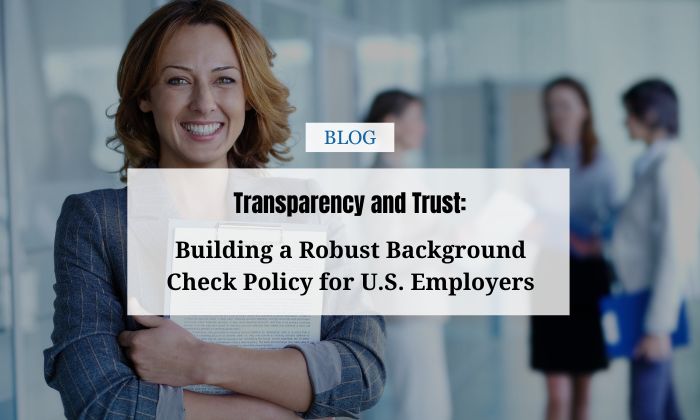The bustling retail industry, with its vibrant stores, e-commerce platforms, and diverse workforce, stands as a cornerstone of modern commerce. As consumers, we engage with this sector on a daily basis, entrusting it to provide us with goods and services that meet our needs and desires. Yet, behind the scenes of the retail world lies a complex challenge: the task of assembling a reliable and trustworthy workforce capable of upholding the integrity and reputation of the brands they represent.
In a world where security breaches, fraud, and employee misconduct can have far-reaching consequences, the retail industry is acutely aware of the importance of maintaining its reputation and safeguarding its customers. This is where the power of retail background checks comes to the forefront. Retail background checks are not just a standard hiring procedure; they are a shield that retail businesses can wield to protect themselves, their employees, and the customers they serve.
Understanding Retail Background Checks
In an era where the success of a retail business hinges on the integrity and reliability of its employees, background checks emerge as a critical tool for shaping a secure and trustworthy workforce. At their core, background checks are a systematic process of investigating an individual’s history, and gathering relevant information to make informed hiring decisions. In the context of the retail industry, where employees interact directly with customers, handle finances, and manage inventory, the importance of this vetting process cannot be overstated.
Defining Retail Background Checks
Background checks encompass a range of inquiries into an applicant’s personal, professional, and criminal history. These checks provide a comprehensive view of an individual’s background, enabling employers to make more informed and responsible hiring choices. Whether it’s a new cashier, a customer service representative, or a manager overseeing a retail location, background checks provide a layer of insight that can help identify potential risks and ensure the safety of employees and customers alike.
Types of Background Checks in the Retail Industry
In the dynamic world of retail, various types of background checks come into play to ensure a holistic evaluation of potential hires:
- Criminal History Checks: Uncovering any history of criminal activity is paramount in the retail industry. This check helps identify applicants with previous convictions that could compromise the safety of the workplace and customers.
- Employment Verification: Confirming an applicant’s previous employment ensures the accuracy of their work history and qualifications. This is particularly important in retail, where prior experience can be directly relevant to the role.
- Education Verification: Verifying an applicant’s educational background ensures that they possess the qualifications they claim. In retail, roles might require specific levels of education, and this verification helps uphold those standards.
- Credit Checks: For positions that involve financial responsibilities, such as handling cash or managing transactions, credit checks can provide insights into an applicant’s financial stability and responsibility.
The power of background checks lies in their ability to unveil hidden aspects of an applicant’s history, offering a balanced perspective that goes beyond the polished image presented in interviews and resumes. As we delve deeper into this discussion, we’ll explore how these checks address unique security concerns in the retail industry and why they are essential for building a foundation of trust with customers.
Addressing Security Concerns
In the bustling realm of the retail industry, where transactions flow and customers engage in shopping experiences, security stands as a paramount concern. The potential risks of employee theft, fraud, and misconduct are realities that retail businesses must contend with to ensure their operations run smoothly and their reputation remains untarnished. This is where the significance of retail background checks becomes strikingly evident.
Unveiling the Security Challenges
The retail industry is unique in that it operates in both physical and digital spaces, with various touchpoints that employees interact with. From the point of sale to inventory management, each step of the retail process involves assets that can be compromised if not managed with vigilance. The threat of internal theft, unauthorized access, and breaches of customer information looms large, underscoring the importance of employing a comprehensive approach to safeguarding the retail environment.
The Role of Background Checks in Mitigation
Background checks serve as a shield against potential security breaches by identifying individuals with questionable histories that might make them susceptible to compromising the security of a retail business. Here’s how background checks specifically address security concerns:
- Preventing Employee Theft: Background checks can reveal past instances of theft, fraud, or dishonesty. By weeding out individuals with such histories, retail businesses can significantly reduce the risk of internal theft that could undermine profitability and customer trust.
- Maintaining Customer Confidentiality: Employees in retail often have access to customer information, including payment details. Background checks help identify individuals who might misuse this sensitive information for personal gain or malicious intent.
- Minimizing Unauthorized Access: Certain roles within retail establishments might involve access to restricted areas or systems. Background checks ensure that those with a history of unauthorized access or breaches are not given access to critical areas.
- Protecting Brand Reputation: A single incident of employee misconduct can have far-reaching consequences for a retail brand’s reputation. By hiring employees with clean records, businesses can demonstrate a commitment to security and integrity.
The power of retail background checks to address security concerns in the retail industry cannot be overstated. They provide a layer of assurance that retail businesses can rely on to build a safe and secure environment for both employees and customers. As we move forward, we will delve into how retail background checks contribute to building customer trust and fostering a positive shopping experience.
Building Customer Trust
In the world of retail, where customers place their trust in brands to deliver quality products and exceptional experiences, the concept of trust goes hand in hand with success. A single negative incident or experience can erode that trust and tarnish a brand’s reputation. This is why cultivating trust becomes not just a goal, but an essential strategy for retail businesses. Retail background checks play a pivotal role in this endeavor, shaping a secure and trustworthy environment that resonates with customers.
The Nexus Between Trust and Retail
Customer trust is the bedrock upon which the retail industry thrives. From the moment customers step into a store or browse an online catalog, they rely on the integrity of the brand to provide them with safe and authentic experiences. Any breach of trust, whether it’s related to employee behavior or data breaches, can lead to customer attrition, negative reviews, and lasting damage to the brand’s image.
The Role of Retail Background Checks
Retail Background checks contribute significantly to building and maintaining customer trust in the following ways:
- Safe Shopping Environment: When customers see that a retail business is committed to conducting thorough retail background checks on its employees, they feel assured that their safety is a priority. This translates into increased footfall and higher online engagement.
- Protection from Employee Misconduct: Employee misconduct, such as theft or inappropriate behavior, can directly impact customers. By screening out individuals with histories of such behavior, retail businesses can prevent potential negative interactions.
- Consistent Customer Experience: Retail background checks ensure that the people representing the brand have the integrity and reliability necessary to provide customers with a consistent and positive experience.
- Data Security: Customers entrust their personal and financial information to retailers. Retail checks help safeguard this data by minimizing the risk of insider threats and unauthorized access.
- Upholding Brand Reputation: Trust is hard-earned and easily lost. By employing retail background checks, retail businesses demonstrate their commitment to upholding their brand’s reputation and ensuring a secure shopping environment.
In a competitive retail landscape, where customer loyalty can make or break a business, retail checks offer a tangible way to nurture trust and build lasting relationships with customers. As we delve deeper into this discussion, we’ll explore the compliance and legal considerations that come into play when implementing retail check processes within the retail industry.
Compliance and Legal Considerations
In the pursuit of assembling a trustworthy and reliable workforce, the retail industry must navigate a complex landscape of regulations and legal obligations. Retail background checks, while indispensable tools for ensuring the safety and integrity of employees and customers, must be executed in a manner that aligns with various laws governing hiring practices. Navigating these compliance and legal considerations is crucial for retail businesses to reap the benefits of thorough background checks without running afoul of the law.
The Regulatory Landscape
Retail businesses must contend with a range of regulations that dictate how background checks can be conducted. Key considerations include:
- Fair Credit Reporting Act (FCRA): The FCRA governs the collection, use, and dissemination of consumer information, including background checks. Compliance involves obtaining proper authorization from candidates, providing adverse action notices when necessary, and ensuring accuracy in reporting.
- Ban the Box Laws: Numerous jurisdictions have enacted “ban the box” laws, which restrict when and how employers can inquire about an applicant’s criminal history. Understanding and adhering to these laws is crucial to avoid discrimination and ensure fair hiring practices.
- Equal Employment Opportunity Commission (EEOC) Guidelines: The EEOC provides guidelines to prevent discriminatory practices during the hiring process. Employers must be cautious not to disproportionately impact certain groups based on protected characteristics.
Strategies for Compliance
To successfully navigate these legal considerations, retail businesses should adopt the following strategies:
- Clear Policies and Procedures: Develop clear and consistent policies for conducting background checks. Document the steps taken to ensure compliance with relevant laws and regulations.
- Informed Consent: Obtain informed consent from applicants before conducting background checks. Provide them with clear information about the process and their rights.
- Individualized Assessment: In cases where background checks reveal potential concerns, consider individualized assessments to determine whether the information is relevant to the job and whether reasonable accommodations can be made.
- Record Keeping: Maintain detailed records of the background check process, including consent forms, adverse action notices, and any correspondence with applicants.
- Stay Current: The legal landscape is ever-evolving. Stay up to date with changes in laws and regulations that impact background checks to ensure continued compliance.
By approaching background checks with a keen understanding of the legal and compliance aspects, retail businesses can simultaneously enhance their security measures and uphold the rights of applicants. As we move forward, we will delve into practical steps for implementing effective background check processes within the retail industry, benefiting both employers and potential hires.
Implementing Effective Retail Background Check Processes
As the retail industry strives to maintain security, trust, and legal compliance, the implementation of effective retail background check processes becomes paramount. These processes not only safeguard the business and its customers but also ensure that potential hires are aligned with the values and standards of the brand. Let’s explore practical steps that retail businesses can take to establish robust retail background check procedures.
Customize the Approach
Identify Relevant Checks: Tailor background checks to specific job roles. For instance, a cashier’s responsibilities may differ from those of a manager, requiring different types of verifications.
Legal Compliance: Ensure that your background check procedures adhere to all applicable laws and regulations, such as the FCRA and ban the box laws.
Clear Policies and Consistent Execution
- Documented Procedures: Develop clear and documented procedures for conducting background checks. These guidelines should outline the steps, timelines, and responsibilities involved.
- Consistency: Apply the same background check process to all candidates within a specific job category. This ensures fairness and minimizes potential legal risks.
Effective Communication
- Transparency: Communicate to applicants that background checks will be conducted as part of the hiring process. Obtain their consent in writing before proceeding.
- Adverse Action Notices: If a background check reveals information that could adversely affect a candidate’s chances of being hired, provide them with a pre-adverse action notice, giving them an opportunity to explain or challenge the findings.
Quality Assurance
- Verified Sources: Ensure that the sources of information used for background checks are reputable and accurate. This could include educational institutions, previous employers, and official records.
- Thorough Investigation: Conduct thorough checks to avoid oversights. A comprehensive approach helps identify potential red flags that may impact hiring decisions.
Qualified Partners
- Background Check Providers: Partner with reputable background check providers that specialize in retail industry checks. Their expertise can ensure accurate and compliant results.
- Legal Counsel: Consult legal experts well-versed in employment law and background checks to guide your procedures and ensure compliance.
Regular Review and Adaptation
- Periodic Assessment: Regularly review and assess the effectiveness of your background check procedures. Make adjustments as needed to address emerging challenges and changes in laws.
- Feedback Loop: Seek feedback from HR teams, hiring managers, and candidates to continuously improve the background check process.
By implementing a well-defined and consistent background check process, retail businesses can not only strengthen their workforce but also instill confidence in customers, suppliers, and partners. As we progress, we’ll explore real-life case studies that demonstrate the tangible benefits of effective background checks in the retail industry.
Benefits Beyond Hiring
While the primary objective of retail background checks in the retail industry is to ensure secure and informed hiring decisions, their impact extends far beyond the initial recruitment stage. Retail businesses that embrace thorough retail checks stand to reap a multitude of benefits that ripple throughout their operations, enhancing employee satisfaction, minimizing turnover, and fostering a culture of trust and excellence.
Creating a Safer Work Environment
- Employee Safety: A comprehensive retail background check process contributes to a safer workplace, reducing the potential for internal incidents that could endanger employees.
- Customer Security: Enhanced employee screening enhances customer safety and trust, creating an environment where patrons feel secure while shopping.
Reducing Turnover and Training Costs
- Retention: Retail background checks help identify candidates who are more likely to align with the organization’s values and expectations, leading to improved employee retention.
- Reduced Turnover: By selecting candidates who are less likely to engage in misconduct or misrepresent themselves, businesses can reduce turnover stemming from dismissals or resignations due to poor fits.
Cultivating a Positive Work Environment
- Team Morale: A culture of integrity and trust is conducive to positive employee morale. When employees feel secure and respected, job satisfaction increases.
- Brand Loyalty: Employees who are aligned with the brand’s values are more likely to become brand ambassadors, positively impacting customer loyalty and engagement.
Mitigating Risk and Liabilities
- Legal Protection: Thorough retail background checks help minimize the risk of hiring individuals with potential criminal backgrounds that could lead to legal liabilities for the business.
- Compliance: Adhering to background check regulations and standards ensures legal compliance, safeguarding the business from potential lawsuits.
Enhancing Operational Efficiency
- Reduced Training Time: Hiring candidates who are well-suited for their roles minimizes the need for extensive training and retraining, saving time and resources.
- Effective Performance: Employees selected through comprehensive background checks are more likely to excel in their positions, contributing to smoother operations.
Building a Reputation of Excellence
- Positive Brand Image: A track record of reliable and ethical employees enhances the brand’s image, attracting both customers and top-tier talent.
- Industry Credibility: Retail businesses known for their commitment to security and integrity become industry leaders and attract partnerships and collaborations.
By recognizing the multifaceted benefits that retail background checks offer beyond the hiring process, retail businesses can strategically position themselves for sustained success in a competitive landscape. As we conclude our exploration, we’ll offer a recap of the pivotal role retail background checks play in shaping the future of the retail industry.
Conclusion
Exploring retail background checks uncovers a vital truth: they’re the bedrock of a secure, trustworthy industry. From fostering trust to legal compliance, they’re committed to excellence, safeguarding customers and employees. Amid evolving retail dynamics, background checks uphold the essence of trust, elevating both businesses and the industry.
Securecheck360
At Securecheck360, we specialize in providing comprehensive Employment Background Screening Services to businesses of all sizes, both nationally and internationally. Our tailored solutions are designed to cater to the specific needs of Small, Mid-Size, and Large organizations, ensuring that they have the necessary tools and information to make informed hiring decisions.
To know more about our services, book your free demo today!







